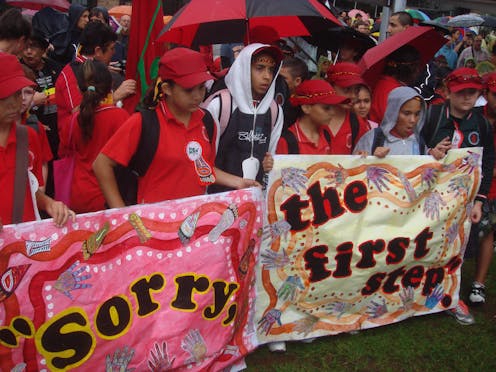Stolen Generation redress scheme won't reach everyone affected by the policies that separated families
- Written by Brendan Loizou, PhD Candidate, University of Technology Sydney

This article contains mentions of the Stolen Generations, and policies using outdated and potentially offensive terminology when referring to First Nations people.
There has been a long debate around whether First Nations people should be compensated for the past acts and conduct of settlers. Recently, the Commonwealth government created the Territories Stolen Generations Redress Scheme to compensate Northern Territory, the Australian Capital Territory and Jervis Bay Stolen Generations survivors.
The primary purpose of the redress scheme is to
help the Stolen Generations to heal the trauma from being forcibly removed from their family.
The redress scheme seeks to specifically “recognise the harm and ongoing trauma of forced removal from family for Stolen Generations survivors” and “assist with the healing of this trauma for the Stolen Generations survivors”.
A way to consider the nature and purpose of any redress scheme is to reflect on whether reconciliation can be achieved through engaging with injustices of the past.
This redress scheme raises questions about the ability of Australia to address the needs of First Nations peoples. Australia still hasn’t properly compensated First Nations people after the recommendations of the Bringing Them Home report 20 years ago.
Addressing past injustices
Damage was created through injustices against First Nations people, and it is the legacy of this damage that Australia needs to address.
This legacy stems from the history of modern settler colonialism, which is defined as
a distinct type of colonialism that functions through the replacement of Indigenous populations with an invasive settler society that, over time, develops a distinctive identity and sovereignty. Settler colonial states include Canada, the United States, Australia, and South Africa.
In 1997, the Human Rights Commission issued the Bringing Them Home report. This landmark document identified the intention of the removal policies was to destroy Aboriginal culture:
one principal effect of the forcible removal policy was the destruction of cultural links. This was of course their declared aim.
The report noted this practice was a form of genocide:
When a child was forcibly removed that child’s entire community lost, often permanently, its chance to perpetuate itself in that child. The inquiry has concluded that this was a primary objective of forcible removals and is the reason they amount to genocide.
On this basis, federal and state governments have been well informed that policies imposed on First Nations people were genocidal in nature.
Read more: Morrison government sets up redress scheme for survivors of Stolen Generation in territories
Limitations of the recent redress scheme
The redress scheme concedes the finding by the Bringing Them Home report that “most [Aboriginal] families have been affected in one or more generations, by the forcible removal of one or more children.”
However, there are limitations to this proposed scheme.
First, the Bringing them Home report is over 20 years old. It would have been more accurate to refer to a more recent report. Organisations such as The Healing Foundation have created many recent reports while working with Stolen Generations survivors.
Second, the purpose behind the redress scheme is to provide financial compensation for the damage caused by the policies and actions impacting Stolen Generations survivors — but only in the territories. It raises questions about other states committing to compensating and providing redress for Stolen Generations survivors.
Third, the nature of trauma requires greater consideration. This ongoing trauma is not just the loss of immediate and extended family and community – but the disconnect from respective lands and culture.
Genocide affects more than one member of the family, and is carried on through generations. So, the issue of trauma suffered by Stolen Generations survivors and their descendants needs to be considered more broadly.
What government should do to help survivors
Over the years, Stolen Generations survivors have attempted to seek justice through litigation, such as the case of Cubillo v Commonwealth. This case sought redress and compensation for the past injustices of policies and practices designed to separate Lorna Cubillio and Peter Gunner from their families when they were children.
However, the High Court found the plaintiffs were not able to sue the Commonwealth for negligence, despite the abuse they endured.
A one-off payment to Stolen Generations survivors isn’t the best way to approach long-term and intergenerational trauma. It would be more effective to provide ongoing support for these survivors through culturally safe health services. It would also be more beneficial for the government to have discussions with Stolen Generations survivors and their families about their respective needs to heal.
This would need to include the consideration of trauma experienced by other Stolen Generations survivors who might not qualify under the eligibility criteria of the redress scheme.
For example, descendants of Stolen Generations are not covered by the redress scheme proposal, despite many of them being impacted by intergenerational trauma.
Australia has a colonial settler legacy, and its effects continue to cause suffering to the families who had their children taken from them. Most have yet to be recognised or compensated. These are the silent victims of policies designed to destroy their culture and the future of their families.
A just society would be able to engage with its past and not shy away from it. However, the colonial settler society of Australia is yet to fully face its past and the legacy of the foundations it was built on, as it struggles to comprehend the nature of a just society.
Authors: Brendan Loizou, PhD Candidate, University of Technology Sydney





